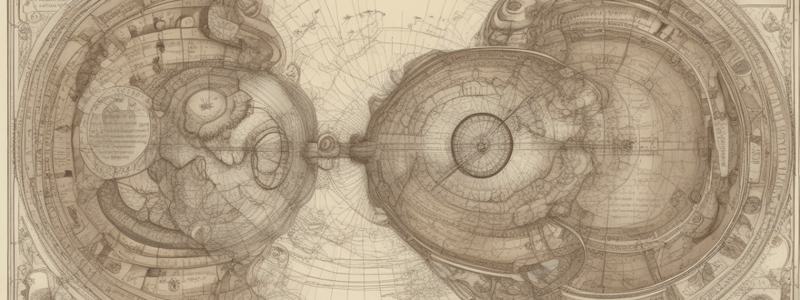Podcast
Questions and Answers
What is a characteristic of non-specialized or popular scientific texts at the lexical level?
What is a characteristic of non-specialized or popular scientific texts at the lexical level?
- Extensive use of noun strings
- Few or no abbreviations (correct)
- Exclusive use of technical jargon
- Frequent use of abbreviations
What is the primary goal of academic research into ESP and popularization?
What is the primary goal of academic research into ESP and popularization?
- To develop a new theory of relativity
- To improve the dissemination of scientific knowledge across communities and cultures (correct)
- To create a new genre of scientific writing
- To explore the history of scientific writing
Which of the following features is characteristic of specialized scientific texts?
Which of the following features is characteristic of specialized scientific texts?
- Extensive use of personalization and multimedia elements
- Oversimplification and definitions
- Frequent use of nominalization and modality (correct)
- Schematization and exemplification
What is a key difference between A Brief History of Time and A Briefer History of Time?
What is a key difference between A Brief History of Time and A Briefer History of Time?
What is the fundamental postulate of the theory of relativity, as described in the passage?
What is the fundamental postulate of the theory of relativity, as described in the passage?
What is a characteristic of popular scientific texts at the textual level?
What is a characteristic of popular scientific texts at the textual level?
What is the significance of 1988 in the context of academic research into ESP and popularization?
What is the significance of 1988 in the context of academic research into ESP and popularization?
What is the primary distinction between specialized and non-specialized scientific texts?
What is the primary distinction between specialized and non-specialized scientific texts?
What is the primary objective of the framework proposed by Cloître and Shinn's 1985 model?
What is the primary objective of the framework proposed by Cloître and Shinn's 1985 model?
What is the primary focus of ESP research, as mentioned in the content?
What is the primary focus of ESP research, as mentioned in the content?
Which of the following authors is NOT associated with research on ESP and genre analysis?
Which of the following authors is NOT associated with research on ESP and genre analysis?
What is the primary characteristic of popular exposition, as identified by Cloître and Shinn's 1985 model?
What is the primary characteristic of popular exposition, as identified by Cloître and Shinn's 1985 model?
What is the purpose of the didactic/pedagogical level of scientific exposition, as identified by Cloître and Shinn's 1985 model?
What is the purpose of the didactic/pedagogical level of scientific exposition, as identified by Cloître and Shinn's 1985 model?
What is a characteristic of intra-specialist level scientific texts at the lexical level, as identified by ESP research?
What is a characteristic of intra-specialist level scientific texts at the lexical level, as identified by ESP research?
What is the primary focus of the research by Jenkins, Rodger, White and Gribbin, and Mellor?
What is the primary focus of the research by Jenkins, Rodger, White and Gribbin, and Mellor?
What is the primary distinction between intra-specialist and inter-specialist level scientific texts?
What is the primary distinction between intra-specialist and inter-specialist level scientific texts?
What is the primary motivation behind the creation of a new edition of a successful book?
What is the primary motivation behind the creation of a new edition of a successful book?
What feature of the new edition makes it more appealing to its intended audience?
What feature of the new edition makes it more appealing to its intended audience?
What is the result of the changes made to the new edition of the book?
What is the result of the changes made to the new edition of the book?
What is the frequency of god's mention in the new edition of the book?
What is the frequency of god's mention in the new edition of the book?
What kind of tone is used in the new edition of the book to cater to younger readers?
What kind of tone is used in the new edition of the book to cater to younger readers?
What is the main goal of 'scientifically correct' or 'ideologically acceptable' vulgarization of science?
What is the main goal of 'scientifically correct' or 'ideologically acceptable' vulgarization of science?
What is the characteristic of the new edition of the book in terms of its ideological neutrality?
What is the characteristic of the new edition of the book in terms of its ideological neutrality?
What is the implication of the changes made to the new edition of the book in terms of ESP and genre analysis?
What is the implication of the changes made to the new edition of the book in terms of ESP and genre analysis?
What is notable about the predictions made by Brief and Briefer?
What is notable about the predictions made by Brief and Briefer?
What phenomenon is observed in both Brief and Briefer?
What phenomenon is observed in both Brief and Briefer?
What is the primary difference in the granularity of Brief and Briefer?
What is the primary difference in the granularity of Brief and Briefer?
What is the target audience implied for Brief, based on its features?
What is the target audience implied for Brief, based on its features?
How does Hawking describe Brief in the Foreword of Briefer?
How does Hawking describe Brief in the Foreword of Briefer?
What is suggested as the reason for the shift in style between Brief and Briefer?
What is suggested as the reason for the shift in style between Brief and Briefer?
What is a characteristic of the ESP passages in Brief compared to Briefer?
What is a characteristic of the ESP passages in Brief compared to Briefer?
What is implied about the content of Brief, based on Hawking's admission?
What is implied about the content of Brief, based on Hawking's admission?
What is the primary goal of Hawking's writing, as mentioned in the text?
What is the primary goal of Hawking's writing, as mentioned in the text?
What is the main difference between Hawking's first book and Briefer?
What is the main difference between Hawking's first book and Briefer?
What does Hawking emphasize as a challenge for the general public?
What does Hawking emphasize as a challenge for the general public?
What is the primary feature of specialized scientific texts, according to the text?
What is the primary feature of specialized scientific texts, according to the text?
What is the purpose of Hawking's writing, as stated in the last chapters of both books?
What is the purpose of Hawking's writing, as stated in the last chapters of both books?
What is the main difference between popular and specialized scientific texts?
What is the main difference between popular and specialized scientific texts?
What is the role of genre analysis in the context of scientific communication?
What is the role of genre analysis in the context of scientific communication?
What is the significance of ESP in the context of scientific communication?
What is the significance of ESP in the context of scientific communication?
Flashcards are hidden until you start studying
Study Notes
Characteristics of Non-Specialized and Specialized Texts
- Non-specialized texts:
- Lexical level: few or no abbreviations, few or no noun strings, (over-)Anglicization
- Syntactic level: little use of nominalization, little use of modality, personalization wherever possible
- Textual level: schematization, exemplification, oversimplification, definitions, reformulation, explanations, multi-media elements
- Specialized texts:
- Lexical level: high word formation, borrowings, noun strings, abbreviations, latinization
- Syntactic level: nominalization, high modality, passive voice, depersonalization
- Textual level: thematization, schematization, cohesive conjunctions, hedging, omissions, crypticity (exclusiveness)
Popularization of Science
- Cloître and Shinn's 1985 model:
- Four levels of scientific exposition:
- Intra-specialist exposition (from specialist to specialist in same field)
- Inter-specialist exposition (from specialist to specialist across fields)
- Didactic/pedagogical exposition (from specialist to non-specialist)
- Popular exposition (intended for the largest audience possible)
- Four levels of scientific exposition:
- Popularization of science:
- Aims to make scientific knowledge accessible to a broader audience
- Features hybridization phenomena, mixing specialized and non-specialized levels of exposition
Analysis of A Brief History of Time and A Briefer History of Time
- A Brief History of Time:
- Features a high degree of granularity, with large chunks of ESP passages linked by short popular sections
- Places at the inter- (sometimes intra-) specialist to didactic level
- More didactic than popular, and often more specialized than didactic
- A Briefer History of Time:
- Features a more balanced alternation between specialized and non-specialized sections
- Tends towards a predominance of the popular from both a quantity and a quality viewpoint
- ESP sections are much reduced and do not go into such detail as those in Brief
Target Audience and Purpose
- A Brief History of Time:
- Target audience: inter- (sometimes intra-) specialist to didactic level
- Purpose: to teach "people without a scientific education" how to "master mathematics"
- A Briefer History of Time:
- Target audience: a broader audience, including younger readers
- Purpose: to provide a more accessible and simplified explanation of scientific concepts, leaving out some of the more technical content
Studying That Suits You
Use AI to generate personalized quizzes and flashcards to suit your learning preferences.




